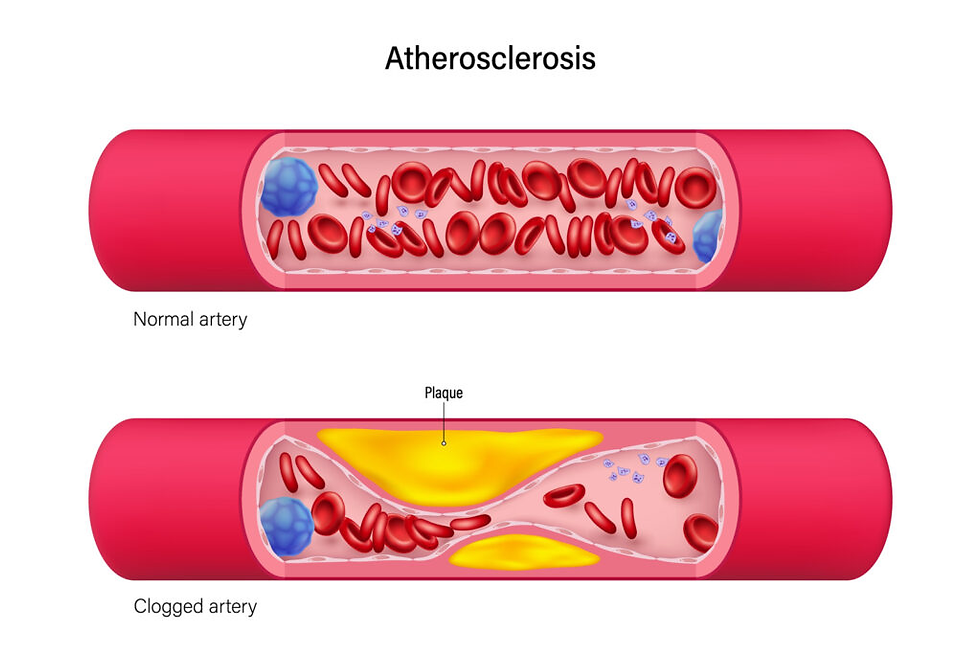Atherosclerosis- The Silent Killer
- aaz206
- Sep 6, 2025
- 4 min read

What is Atherosclerosis?
Atherosclerosis is the the formation and build up of fatty material, atheroma, also known as plaque in the artery walls. This is where blood passes from the heart to the rest of the body.
Overtime, the plaque builds up and hardens, causing the inside of the artery (lumen) to become narrower, as shown in Figure 1. Therefore blood flow and its passing through the artery becomes more difficult compared to a healthy artery. The pressure of blood flow is the same but for an artery with plaque, the space and surface area available for blood flow is reduced, as compared to a healthy artery. The more plaque present, the narrower the lumen of the artery becomes and as a result, this can cause blockages and blood clots, heart attack, stroke and other heart diseases.
Factors like unhealthy and high in salts, sugars, fats and cholesterol diets can contribute to plaque formation as well as other factors like genes and health conditions, such as high blood pressure and diabetes
(Fan and Watanabe,2022)

Who can get Atherosclerosis?
Unfortunately, anyone can be affected with Atherosclerosis and its usually not realised until it becomes serious e.g. causing a heart attack or stroke or an artery is narrowed or blocked. However, those over 65 or who have a family history of circulatory or heart disease can be at higher risk.
Symptoms?
It can be difficult to know that you have Atherosclerosis as atheroma develop and harden over a long time and many people do not present with or are unaware of any symptoms.
Unfortunately, this can be the case for many individuals and they only become aware after the situation becomes serious. Therefore, trying to maintain a healthy lifestyle is important as this can reduce chances of Atherosclerosis and plaque build up. This is because a sedentary lifestyle and diet, such as that high in salts, sugars, processed foods and fats are a huge contributing factor to plaque formation.
Reducing or avoiding a sedentary lifestyle and unhealthy diets is important to avoid atherosclerosis and other heart diseases. Those also with a family history of Atherosclerosis or heart disease can be at a higher risk.
Common symptoms however can include:
chest pain
confusion (due to a lack of blood supply able to reach the brain)
feeling very tired
a difficulty breathing
weak muscles
a pain in your limbs ( this is usually where the artery blockage is)
It is important to see a GP with these types of symptoms!
Who is at risk and factors affecting Atherosclerosis formation?
Those 65 years of age or older
Family history of Atherosclerosis or other heart related conditions.
Conditions such as high blood pressure, cholesterol or diabetes.
Being overweight or obese
Smoking
Unhealthy diet e.g. high in sugars, fats, processed foods and salts.
Sedentary lifestyle and lack of exercise
High levels of alcohol consumption- UK recommendation for consumptions is 14 units weekly
Ethnicity
(Fan and Watanabe,2022)
What happens if it gets left untreated?
Untreated Atherosclerosis can lead to very serious health issues, such as:
Angina- a discomfort or pain in the chest due to a lack of blood reaching the heart muscle.
Coronary Heart Disease
Stroke
Heart attack
Peripheral Arterial Disease-Where the leg muscles do not receive an adequate amount of blood. Therefore, this can cause calves, thighs, buttocks and hip pain, especially during walking or when exercising.
Treatment
The developed plaque cannot be gotten rid of but its progress can be slowed, through treatments and medicines to help you live a more 'normal' life and reduce symptoms.
With discussion from your doctor, treatment choice vary including
Change to lifestyle- avoiding unhealthy diets, sedentary lifestyle and lack of exercise, not smoking and reducing alcohol intake. Not only for atherosclerosis but as it also causes other heart conditions which contribute to plaque formation.
We want to reduce high cholesterol levels through this change to a healthy lifestyle as cholesterol contributes to plaque formation.
A procedure such as Coronary bypass surgery if the arteries are very narrowed or blocked.
Medication that reduces high blood pressure, cholesterol risk of blood clot as high levels of these can cause Atherosclerosis, ultimately resulting in blood clots and serious heart conditions.
Preventions
Diet and eating healthy-Balanced diets are always important. However, so is a healthy one. You should try to eat less high in fats, salts and sugar foods.
Reduce alcohol consumption to the recommended amount (less than 14 units a week) or less, or completely stop it.
Quit smoking and use of any other tobacco products.
Exercise and staying active-This helps boost your energy levels, improvement for better heart health and can contribute to better sleep at night.
Weight- Keep to a healthy weight and not within overweight or obese categories.
Medications- If doctor has prescribed medications for e.g. diabetes, blood-pressure or high cholesterol, it is important to take them, as advised.
(British Heart Foundation,2022).
References
British Heart Foundation (2022) Atherosclerosis-BHF. [Available at: https://www.bhf.org.uk/informationsupport/conditions/atherosclerosis#How_do_I_prevent_atherosclerosis] (Accessed: 13/07/2025 and 19/07/2025).
Fan,J. and Watanabe,T. (2022) 'Atherosclerosis:Known and unknown', Pathology international,72(3),pp.151-160. doi:10.1111/pin.13202. Epub 2022 Jan 25.
hearts4heart (2024) ATHEROSCLEROTIC CARDIOVASCULAR DISEASE [Available at: https://hearts4heart.org.au/atherosclerotic-cardiovascular-disease/] (Accessed 13/07/2025).
Assessed and Endorsed by the MedReport Medical Review Board






